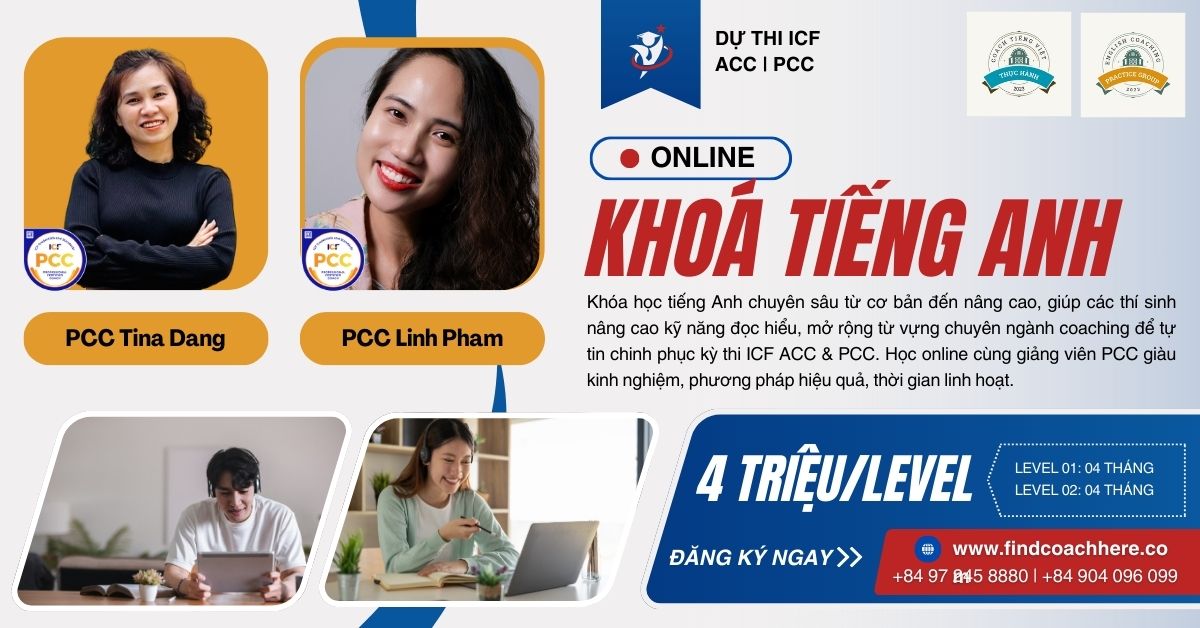Tiếng Anh Chuyên Ngành Coaching - Chìa Khóa Mở Cửa Chứng Chỉ ICF ACC & PCC

Đã đến lúc xóa bỏ rào cản ngôn ngữ và tự tin chinh phục mục tiêu chứng nhận ICF của bạn!
Becoming an Executive Coach was never part of my original plan. In fact, for a long time, I didn’t even know such a thing existed. But throughout my early career, one question kept haunting me: Why is it that, in the same training session, taught by a brilliant, knowledgeable trainer — some people light up with clarity and motivation, while others walk out quietly, unchanged?
I’ve worked as a trainer in many companies — from insurance to national-level distribution to large manufacturing corporations. My sessions were generally well-received. People clapped, gave great feedback. And yet… somewhere in the crowd, I always caught a pair of distant eyes. Talented people who seemed… lost. Promising minds who didn’t seem to ignite. And I kept asking myself: Is this the best I can offer them?
I couldn’t let it go.
Then one day, a friend invited me to a basic coaching class. And right in the first session, when I heard about “presence” and “not giving advice” — my heart skipped a beat. Something deep in me stirred: This… this might be it!!! I kept learning, quietly observing, reading more about the profession, and practicing with friends. By the end of that basic course, I felt this quiet happiness wash over me. Could it be? Did I just find what I’ve been looking for all along?
At the end of the course, while some classmates stayed to celebrate their “awakening,” I found myself packing a metaphorical backpack, lacing up my boots, and staring into the forest of coaching ahead — barely touched, still unknown. A few of us chose to keep walking. It wasn’t the popular path, but it was the one that called to something essential inside me.
I dove right into advanced courses, practiced relentlessly, and trained with seasoned mentors. For months, I coached 25 to 30 sessions per week — not of pressure, but because I felt most alive in those moments.
Later, when I had enough financial stability, I enrolled in the Professional Executive Coach certification with the Center for Executive Coaching (U.S.). I finished it in under a year. The tools were great — but I quickly realized that applying them in Vietnam needed adaptation. So I began the real work: restructuring, localizing, translating them into something usable and resonant for Vietnamese leaders and coaches. And that’s when I began to answer the question that haunted me years ago — not with theory, but with deep research and hands-on experience.
I still remember one of my first clients — a regional manager. He came in thinking he needed to “communicate better with his team.” But by the third session, he realized the real issue wasn’t his words — it was his inconsistency. He wasn’t even sure what he truly stood for. In our 6th session, he looked at me and said — almost like a confession: “I thought I wanted stability. But maybe I’ve just been drowning in it.”
From there, more leaders came — all through word of mouth. They didn’t come for cheerleading or emotional support. They came for clarity. For someone grounded, non-judgmental, and deeply present — to sit with them in their hardest decisions and loneliest moments. Meanwhile, if you’ve never heard of Executive Coaching — or even if you have — many leaders still hold the belief that “I shouldn’t need help,” that they’re capable, that they’re paid to handle it, and that they must push through on their own. This belief only deepens the sense of isolation at the top, where the wind is strongest.
That’s when I understood: Executive coaching is not totally the same as life coaching. With life coaching, we can wait months for a shift in mindset. But leaders? They can’t afford to wait. They don’t live for themselves alone. A delayed decision can cost the entire organization. Yet they also cannot afford to trade their humanity for rigidity — achieving goals at the expense of losing themselves.
I remember a female director in the South — overseeing 35 stores — just about to be promoted to regional head. She was exhausted. In one session, she admitted: “I don’t even know why I want to be promoted anymore.”
But after 5 sessions, she reconnected with what she once stood for — not power, but creating happier workspaces for women in remote areas. With that clarity, she stepped into her new role — not with armor, but with authenticity.
I don’t come to light fires — my fire only works for me. What I offer is a mirror. And when they — these leaders — catch a glimpse of the flicker inside, they know how to grow it, fuel it, and lead from it.
To me, Executive Coaching sits at the intersection of deep presence and sharp effectiveness. Between inner clarity and external demands. I don’t pick a side. I stand in the middle. And from there, I help leaders not merely balance — but integrate who they are with how they lead. Unlike coaching approaches that focus on techniques to drive change in leaders, Executive Coaching emphasizes the genuine presence of the coach in the process — to accompany and reflect both the potential and the inner blocks within you, as you navigate your own world. It’s about being with you to recognize the most pivotal moments in your unique leadership development journey.
If I could leave you with one belief, it would be this:
You don’t have to sacrifice who you are to succeed — and you don’t have to abandon success to stay true to yourself. Happiness and achievement can walk hand in hand.
1. C-SUITES , LEADERS & MANAGERS WHO WANT TO INTEGRATE COACHING INTO THEIR LEADERSHIP
You lead people. You carry goals, deadlines, and expectations. And deep down, you wish for a way to help your team thrive — not by pushing harder, but by trusting deeper. You may find this program truly valuable if you are:
• A C-suite, or a mid-level or senior leader who wants to shift from command-and-control to a style of leadership that sparks awareness, invites ownership, and builds trust.
• An Organizational Development (OD) specialist seeking to nurture a culture where people grow from the inside out, not just follow instructions.
• An HRBP or HR Director looking for tools to help senior managers unlock their leadership blind spots — not just to perform better, but to become the kind of leader people want to follow.

2. COACHES FROM OTHER NICHES WHO WANT TO GO DEEPER INTO EXECUTIVE COACHING
You may already be a life coach, business coach, or career coach. And the more you work with clients, the more you notice: Many of them are leaders. Their dilemmas are more complex. Their systems, more layered. This program can support you if you:
• Want to elevate your approach to work with strategic-level decisions and wider organizational impact.
• Need more structure, tools, and systems-thinking to coach not just the person, but the leader within the system they operate.
• Are looking to step into a more specialized, long-term impactful niche — where you’re not just a supporter, but a partner in their leadership evolution.
3. PROFESSIONALS IN OTHER FIELDS WHO WANT TO BRING COACHING INTO YOUR WORK WITH CLIENTS
You may come from a completely different path — counseling, training, management, mentoring — and you feel ready to explore coaching as a serious skillset, not just a side note. This program will help you:
• Build a solid foundation of coaching mindsets and core competencies aligned with international standards.
• Learn how to lead powerful coaching conversations with executives — without falling into the trap of giving advice or over-directing.
• Start your own coaching journey with integrity, by blending your past expertise with a new way of being — one that brings out the best in your clients without losing the humanity in your work.
Let this be the beginning of something deeper — for your clients, your career, and yourself.
You don’t have to fit a mold. Just come with an open heart and a steady why.
